 |
|
Sumitomo Group Public Affairs Committee strives to support college students’ negotiation skills, assist in upgrading higher education and contribute to global human resource development through the Intercollegiate Negotiation Competition.
The 9th intercollegiate negotiation competition was held at Sophia University in Tokyo, on December 4th and 5th, 2010. This year’s competition featured students from 17 schools: University of Tokyo, Kyoto University, Osaka University, Kyushu University, Hokkaido University, Nagoya University, Chuo University, Doshisha University, Waseda University, Keio University, Sophia University, Hitotsubashi University, Tohoku University, Gakushuin University, Ritsumeikan University ,The Australian National University and The University of Sydney. In total, 270 undergraduate and graduate students from these 17 universities performed enthusiastically.
|
 |
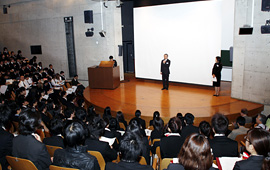
Opening ceremony
|
| |
|
|
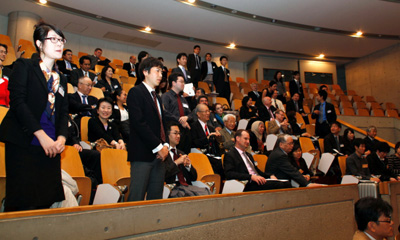 |
|
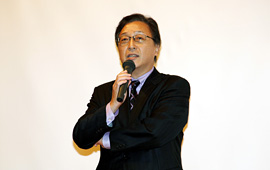
Hisakazu Suzuki, Secretary General, Sumitomo Group Public Affairs Committee
|
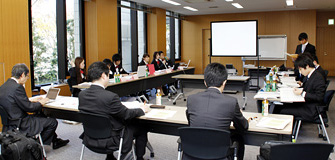
Performance in Japanese
|
 |
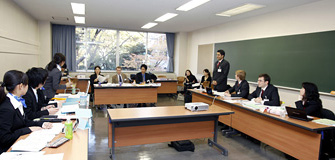
Performance in English
|
Pairing
<Japanese>
|
|
Round A/arbitration
|
Round B/negotiation
|
|
Red
|
Blue
|
Red
|
Blue
|
|
1
|
Gakushuin1
|
Ritsumeikan1
|
Gakushuin1
|
Kyushu1
|
|
2
|
Tokyo1
|
Kyoto2
|
Nagoya
|
Hokkaido
|
|
3
|
Waseda1
|
Keio1
|
Tohoku1
|
Kyushu2
|
|
4
|
Osaka2
|
Ritsumeikan2
|
Sophia3
|
Chuo1
|
|
5
|
Sophia2
|
Hitotsubashi1
|
Tokyo1
|
Hitotsubashi2
|
|
6
|
Sophia1
|
Keio2
|
Osaka2
|
Chuo2
|
|
7
|
Nagoya
|
Chuo1
|
Osaka1
|
Keio1
|
|
8
|
Waseda2
|
Kyushu1
|
Waseda3
|
Ritsumeikan2
|
|
9
|
Tohoku1
|
Ritsumeikan3
|
Australia
|
Ritsumeikan3
|
|
10
|
Osaka1
|
Kyoto1
|
Waseda1
|
Kyoto1
|
|
11
|
Australia
|
Kyushu2
|
Sophia2
|
Kyoto2
|
|
12
|
Tokyo12
|
Doshisha2
|
Sophia1
|
Doshisha1
|
|
13
|
Tohoku2
|
Doshisha1
|
Tokyo2
|
Ritsumeikan1
|
|
14
|
Waseda3
|
Chuo2
|
Tohoku2
|
Hitotsubashi1
|
|
15
|
Gakushuin2
|
Hitotsubashi2
|
Waseda2
|
Doshisha
|
|
16
|
Sophia3
|
Hokkaido
|
Gakushuin2
|
Keio2
|
<English>
| |
Round A/arbitration
|
Round B/negotiation
|
|
Red
|
Blue
|
Red
|
Blue
|
|
1
|
Waseda
|
Hitotsubashi
|
Sophia1
|
Doshisha1
|
|
2
|
Gakushuin
|
Keio
|
Tokyo
|
Chuo
|
|
3
|
Sophia2
|
Kyoto1
|
Australia
|
Kyoto2
|
|
4
|
Nagoya1
|
Doshisha1
|
Nagoya2
|
Ritsumeikan
|
|
5
|
Osaka
|
Chuo
|
Waseda
|
Kyushu1
|
|
6
|
Nagoya3
|
Kyushu1
|
Nagoya1
|
Hitotsubashi
|
|
7
|
Australia
|
Doshisha2
|
Osaka
|
Doshisha2
|
|
8
|
Nagoya2
|
Kyoto2
|
Gakushuin
|
Kyoto1
|
|
9
|
Tokyo
|
Kyushu2
|
Sophia2
|
Kyushu2
|
|
10
|
Sophia1
|
Ritsumeikan
|
Nagoya3
|
Keio
|
|
Problem establishment and competition outline (Red vs. Blue companies)
|
The theme of this year’s competition focused on two major challenges encountered after the basic agreement between the fictitious countries; (1) the license of technology for reducing carbon dioxide emissions and (2) the association of building a biomass power plant in Negoland between two companies, the Blue Company, which played the role of a company which is one of the five largest power generator companies in the fictitious advanced nation of Arbitria; and the Red Company, which played the role of a general company in the fictitious country of Negoland.
On the first day, the issue was “arbitration.” Regarding the trading of technology for reducing carbon dioxide emissions; (1) Whether or not the demand from the Red company to the Blue Company should be accepted and also whether the Blue Company should immediately stop supplying the license to the power for Negoland (third party) and pay the Red company 1 million dollars. (2) Whether or not the Blue Company has any liability for paying 15 million dollars which is half the price of the government grant to the Red company. Finally, regarding the trading of biomass power; (1) and whether or not the Red company has any liability for paying 1.5 million dollars as an upfront-fee to the Blue Company. Those were the points that were discussed.
On the second day, the subject was “negotiation.” The negotiations were conducted just like a real business; trying to find a way to solve a problem for “arbitration” with negotiation, instead of waiting for a judgment on the arbitration and predicting new situations, and taking into account future business between these companies.
|
 |
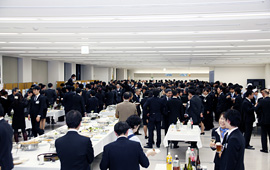
Party at the canteen of Sophia University
|
Judges
|
The theme of this year’s competition focused on two major challenges encountered after the basic agreement between the fictitious countries; (1) the license of technology for reducing carbon dioxide emissions and (2) the association of building a biomass power plant in Negoland between two companies, the Blue Company, which played the role of a company which is one of the five largest power generator companies in the fictitious advanced nation of Arbitria; and the Red Company, which played the role of a general company in the fictitious country of Negoland.On the first day, the issue was “arbitration.” Regarding the trading of technology for reducing carbon dioxide emissions; (1) Whether or not the demand from the Red company to the Blue Company should be accepted and also whether the Blue Company should immediately stop supplying the license to the power for Negoland (third party) and pay the Red company 1 million dollars. (2) Whether or not the Blue Company has any liability for paying 15 million dollars which is half the price of the government grant to the Red company. Finally, regarding the trading of biomass power; (1) and whether or not the Red company has any liability for paying 1.5 million dollars as an upfront-fee to the Blue Company. Those were the points that were discussed.
On the second day, the subject was “negotiation.” The negotiations were conducted just like a real business; trying to find a way to solve a problem for “arbitration” with negotiation, instead of waiting for a judgment on the arbitration and predicting new situations, and taking into account future business between these companies.
|
 |
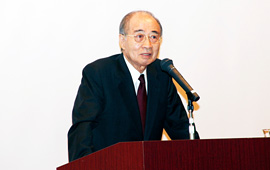
Guest Speech
Former UN Undersecretary General
The director of the International House of Japan
Akashi Yasushi
|
Results of the 9th Intercollegiate Negotiation Competition.
The trophy will be new next year for the 10th anniversary; therefore this year is the last year for the current design. The result of this competition was the third straight win for Tokyo University but all of the schools and students did their best and it was a very successful and meaningful competition.
The final results for 2010 are as follows
The 1st prize : University of Tokyo
The 2nd prize : Hitotsubashi University
The 3rd prize : Osaka University
The 4th prize : The Australian National University and The University of Sydney
The 5th prize : Sophia University and Waseda University
|
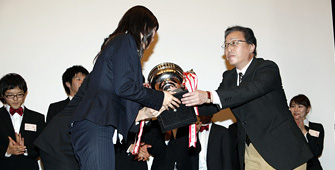
Presentation of championship cup
|
 |
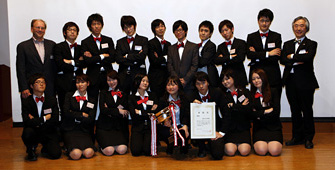
The University of Tokyo, winner of the 9th Intercollegiate Negotiation Competition.
|
|